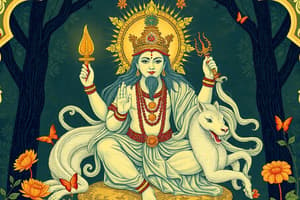Podcast
Questions and Answers
Who is considered the father of modern Hindi literature?
Who is considered the father of modern Hindi literature?
Premchand
Which movement in Hindi poetry emphasized the use of a 'pure' form of Hindi?
Which movement in Hindi poetry emphasized the use of a 'pure' form of Hindi?
Shudh movement
Name a 19th-century Hindi playwright known for works like 'Bharat Darshan.'
Name a 19th-century Hindi playwright known for works like 'Bharat Darshan.'
Bhartendu Harishchandra
Which 20th-century Hindi poet explored themes of love, loss, and social realities?
Which 20th-century Hindi poet explored themes of love, loss, and social realities?
What is one theme explored in modern Hindi literature today?
What is one theme explored in modern Hindi literature today?
Give an example of a 20th-century Hindi playwright who focused on social issues and cultural identity.
Give an example of a 20th-century Hindi playwright who focused on social issues and cultural identity.
What religious movement in the 11th century contributed to the emergence of Hindi literature?
What religious movement in the 11th century contributed to the emergence of Hindi literature?
Which 16th-century movement in Hindi literature focused on secular themes and worldly pleasures?
Which 16th-century movement in Hindi literature focused on secular themes and worldly pleasures?
During which period did Hindi literature truly emerge with its own distinct character?
During which period did Hindi literature truly emerge with its own distinct character?
Who were some of the early authors in Hindi literature during the 16th century?
Who were some of the early authors in Hindi literature during the 16th century?
What language formed the foundation for later literary developments in Hindi literature?
What language formed the foundation for later literary developments in Hindi literature?
How many people worldwide speak Hindi, making it an integral part of the rich literary tradition of the Indian subcontinent?
How many people worldwide speak Hindi, making it an integral part of the rich literary tradition of the Indian subcontinent?
Flashcards are hidden until you start studying
Study Notes
Exploring the World of Hindi Literature
Hindi, a language spoken by over 610 million people worldwide, is an integral part of the rich literary tradition of the Indian subcontinent. As we delve into the realm of Hindi literature, we'll discover a diverse and ever-evolving tapestry of stories, poetry, and drama that spans the centuries.
Origins and Evolution
Hindi literature's roots can be traced back to the Vedic period, where Sanskrit texts formed a foundation for later literary developments. However, it was during the medieval period that Hindi literature truly emerged with its own distinct character.
The 11th century saw the rise of the Bhakti movement, a devotional and spiritual tradition that emphasized the importance of individual experience and expression. Shared by both Hindus and Muslims, Bhakti poetry drew on regional languages, and Hindi was one of the many to benefit from this literary renaissance.
Following this religious movement, the 16th century witnessed the advent of the Nayak movement, which focused on secular themes and encouraged the literary appreciation of worldly pleasures. This era saw an explosion of poetry, with authors such as Bihari and Surdas producing some of the earliest Hindi literature.
Hindi Prose and Poetry
Hindi literature comprises a rich array of genres, including prose and poetry.
Prose
The 19th century saw the emergence of modern Hindi prose with the works of authors such as Ishwarchandra Vidyasagar, Keshabchandra Sen, and Bankimchandra Chatterjee. Their writings emphasized the importance of the vernacular language in facilitating widespread education and social reform.
The 20th century brought with it a new generation of writers, including Premchand, who is considered the father of modern Hindi literature. His works, such as "Godan," "Rangbhumi," and "Nirmala," dealt with social issues and realities and are seen as some of the finest examples of modern Hindi prose.
Poetry
Hindi poetry, too, has a rich history, with poets such as Kabir, Tulsidas, and Surdas shaping the genre's development. The 19th century saw the emergence of the Shudh movement, which emphasized the importance of using a 'pure' form of Hindi without regional variations.
The 20th century brought with it a new era of Hindi poetry, with poets such as Suryakant Tripathi 'Nirala,' Dinkar, and Mahadevi Verma writing works that explored themes such as love, loss, and social realities.
Hindi Drama
Hindi drama, too, has a rich and diverse history, with the earliest examples dating back to the 19th century. Plays such as "Bharat Darshan" by Bhartendu Harishchandra and "Saraswati Sabha" by Shridhar Sarvkar are considered some of the earliest examples of modern Hindi drama.
The 20th century brought with it a new era of Hindi drama, with playwrights such as Mohan Rakesh, Vijay Tendulkar, and Girish Karnad writing works that explored themes such as social issues, personal struggles, and cultural identity.
Hindi Literature Today
Hindi literature today is a vibrant and diverse field, with writers exploring new themes and forms. The advent of modern technology has enabled writers to reach wider audiences, with many opting for digital platforms to showcase their works.
Today, Hindi literature continues to explore themes such as identity, culture, and social issues, with writers such as Uday Prakash, Arundhati Roy, and Ramdarshan Mishra producing works that challenge traditional boundaries and push the limits of the genre.
In conclusion, Hindi literature is a vast and diverse field, with a rich history that spans the centuries. From the spiritual poems of the Bhakti movement to the social commentary of modern writers, Hindi literature continues to explore new themes and forms, offering us a unique window into the Indian subcontinent's rich cultural landscape.
Studying That Suits You
Use AI to generate personalized quizzes and flashcards to suit your learning preferences.




